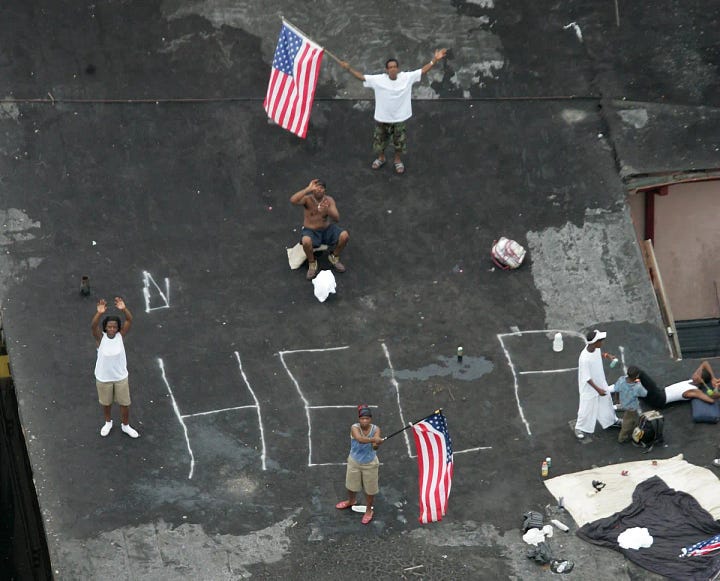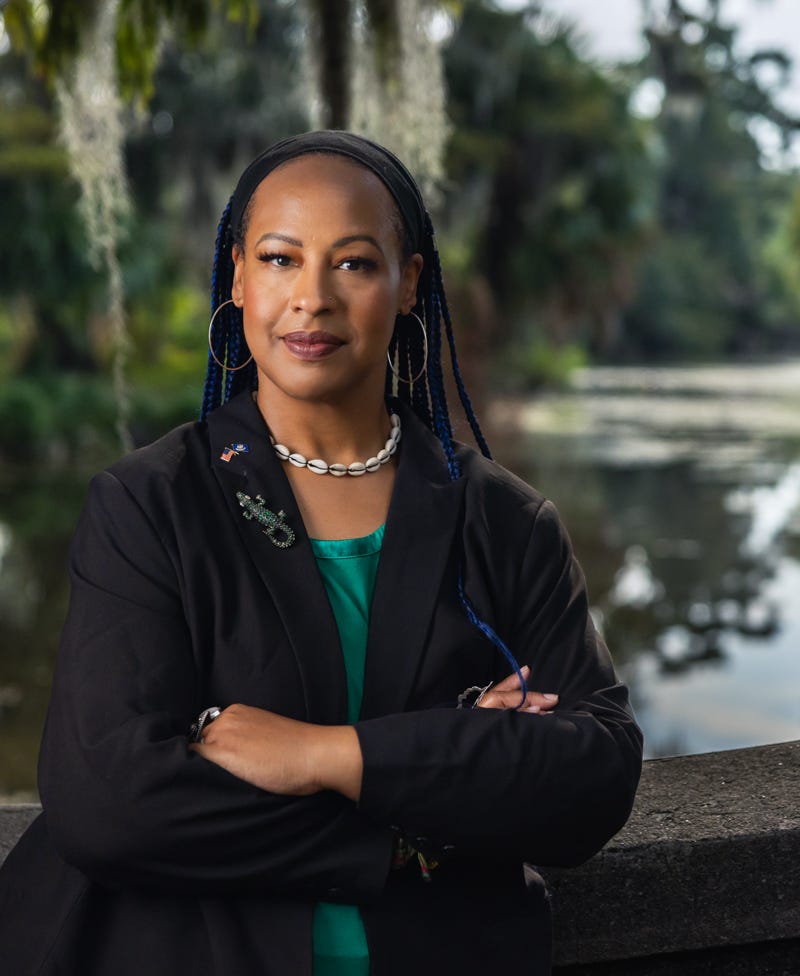Colette Pichon Battle
Shaped by a Storm
On Monday, August 29, 2005, Hurricane Katrina made landfall east of New Orleans. For days the city had been bracing for a direct hit but now a collective sigh of relief began to spread. Then, along the Industrial Canal came the first signs of trouble. Water was pouring over the levee and into the Lower 9th Ward. Emergency radios lit up with reports of other levees being breached, 28 in all. Eighty percent of the city went underwater and 800,000 residents were left stranded.
As Katrina rolled into the Gulf, southern Louisiana native Colette Pichon Battle watched from her home in Washington, DC. Her Creole family’s long history of reading storms filled her with certainty that this storm was different. That same history also told her that her family would never run. Instead, they would gather, cook everything in the freezer, and hold a hurricane party. With growing concern, she called her mom stressing the storm’s size. It covered the entire Gulf. She went on to insist that her mother hunker down at an uncle’s hilltop home. Hide from wind, run from water. Her mom finally conceded but, ultimately, it made no difference. Katrina’s 30-foot tidal surge left 12 feet of standing water around her uncle’s home. It was the home Collette’s grandfather had built; the home her mother was born in; and the home where Collette was born too.
“If you don’t cry deep, hard tears, for the state of this planet and all of the people on it, you don’t yet understand the problem.”
Colette Pichon Battle
In 2005, Collette Pichon Battle was a powerful attorney with dreams of becoming Secretary of State and a prosecutor of international crimes at the Hague. However, Katrina produced “a crack in the universe” and those dreams were suddenly inconsequential. She flew to New Orleans, rented a car, and drove across the Lake Pontchartrain bridge. The water, once teeming with life, was now a dull brown and stagnant. A putrid smell hung heavy in the air. Gone were the houses and restaurants that had once dotted the landscape.
Pichon Battle went directly to the frontlines of her community. These were the people who had held countless fish fry’s to help pay for her degree at Kenyon College and later her law degree at Southern University Law Center. What she found was desperate families who were signing legal documents with the federal government without fully understanding the terms or consequences. She intervened and began offering legal counsel and other relief services. This work would eventually lead to the formation of Pichon Battle’s first non-profit organization, the Gulf Coast Center for Law and Policy (GCCLP).
Hurricane Katrina impacted more than half a million people across a 90,000 square-mile radius encompassing Louisiana, Mississippi, and Alabama. The magnitude of the devastation offered a first glimpse into the emerging realities of climate change. With warming oceans, storms would become both more frequent and intense. More people would be impacted and more people would be forced to relocate, some temporarily and some permanently. On this last point, Hurricane Katrina laid bare the systemic racial issues and structural flaws within the nation’s disaster recovery plans. Pichon Battle characterized it, “The laws as they are written now are not for me, my community, they are not meant to save people…You see how it played out in terms of who got rescued.” In a post-Katrina public meeting, Federal Emergency Management Administration (FEMA) officials would be forced to agree stating, ”The disaster recovery process in this country is designed for the middle class.”


To tackle the systemic racial and structural issues that Katrina exposed, Pichon Battle expanded the work of her GCCLP organization. Climate Justice became a chief organizing principle and her team moved strategically to act on the federal, state, and local levels. New policy proposals around disaster preparation and recovery were drafted. Grassroots movements focused on education and advocacy were organized. Partnerships with regional leaders were leveraged to establish climate justice networks across the Gulf South.
Two years after Katrina, Pichon Battle’s work took on a new sense of urgency. Sitting in a climate change meeting, she watched as images of flood maps and time-lapsed photos revealed how rising sea levels were impacting coastal communities. Each time the screen image refreshed, she saw her family’s land, the land they had lived on since the 1700s, slowly disappear. For Pichon Battle, each successive image took away…”who I was, who I am, and where I’m from….” That revelation became the driving force behind the creation of Taproot Earth in 2022. Pichon Battle became committed to “saving the parts of the world that can still be protected.” To save those communities is to save kinship circles, cultural traditions, and generational wisdom.
"There is an ecological transformation unfolding in the places we love and come from. On a front edge of this reality, which will affect us all, Colette Pichon Battle is a singular model of brilliance and graciousness of mind and spirit and action."
Krista Tippett, On Being
A taproot is the central vein running downward through a plant and carrying nourishment to the smaller veins that push outward. Similarly, Taproot Earth serves global communities by gathering and circulating the wisdom and practices of those on the frontlines of climate change. It is a way of respecting that, within those communities and their traditions, lies deep knowledge of planning and rebuilding processes. Taproot further supports these communities by securing and distributing resources to sustain their efforts. This “on-the-ground work” occurs within a leadership framework focused on transforming economic, political, and social systems. Pichon Battle believes that it is this type of systemic overhaul that is needed to ensure, among other things, that any new solutions do not reproduce previous imbalances and injustices. What will have been attained by the switch to solar energy and electric cars if the construction of solar farms destroys agricultural lands and the extraction of minerals for lithium-ion batteries leads to water pollution and habitat destruction within communities?
Colette Pichon Battle’s work has significant ramifications for the field of conservation. While we are already grappling with many of the consequences of climate change including loss of biodiversity, species extinction, and ecosystem disruption, we must expand our view to acknowledge the inextricable link between conservation and people. To save land within this emerging context is to protect the economic livelihoods of those in frontline communities; it is to preserve their cultural heritage and; it is increasingly to save their lives.*
As Collete Pinchon Battle watched Hurricane Katrina from her home in Washington DC, her personal and professional life broke open. She responded as a daughter, a cousin, a friend, and a lawyer. Sitting in Spain watching those same images was singer/songwriter Natalie Merchant who was also moved to respond. She later said that, as she watched, she knew that the people of New Orleans were being changed forever. At that moment, she did what she could. She wrote a song.
*Future posts will continue to explore the intersection of climate change and the field of conservation.
Colette Pichon Battle's Honors and Service
Video Resources:
One of Colette Pichon Battle's First Ted Talks
Colette Pichon Battle at Bioneers
Colette Pichon Battle on the History of Taproot Earth
Notes:
Who Knew When the Levees Broke
Taproot/The U.S. is not prepared for climate impacts
WIRED, Kate Knibbs, Colette Bichon Battle's Plea
State of Louisiana Climate Goals
Aspen Ideas 2023 Conference, Come Hell or High Water
Jeff Goodell, The Water Will Come
Prevention Web, Mental Stress from Climate Change
Louisiana.gov, Isle de Jean Charles, LA Resettlement



Fantastic article and list of resources. She is a national treasure. Her work is critical. Thanks for profiling her.
So, so inspiring. Thank you!